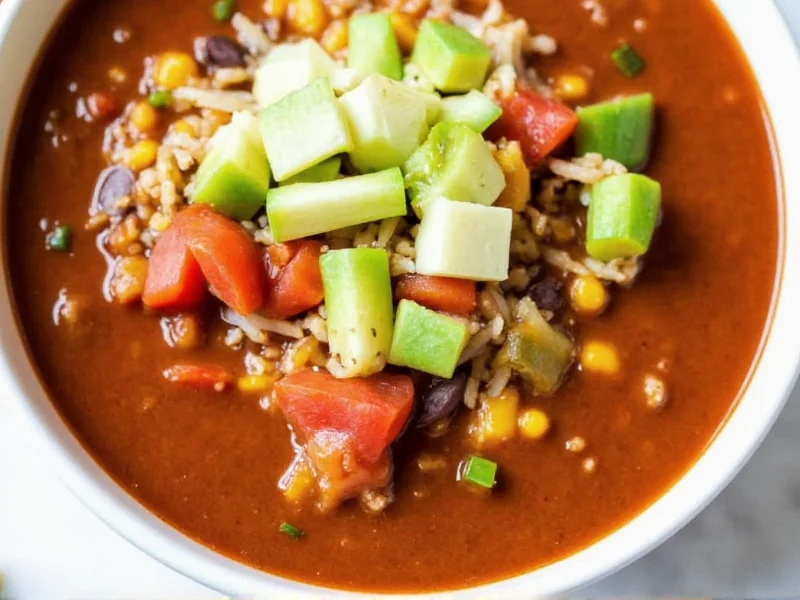The Ultimate Guide to Low Carb Taco Soup
Creating a satisfying low carb taco soup requires strategic ingredient substitutions without sacrificing flavor. Unlike traditional versions loaded with beans and corn, the best low carb taco soup recipes focus on quality proteins and non-starchy vegetables. This approach delivers a hearty meal that aligns with ketogenic, diabetic, and weight management dietary goals while providing essential nutrients.
Why Choose Low Carb Taco Soup?
Low carb taco soup offers significant health advantages over conventional versions. By eliminating high-carb ingredients, you create a meal that stabilizes blood sugar, supports weight management, and provides sustained energy. The high protein content (typically 25-30g per serving) promotes satiety, reducing cravings and unnecessary snacking. This makes it an excellent choice for those following keto diets, managing diabetes, or seeking healthy dinner solutions.
Essential Ingredients for Authentic Flavor
The foundation of any exceptional low carb taco soup starts with quality ingredients that deliver maximum flavor with minimal carbs. Choose these key components:
| Core Ingredient | Carb Content (per cup) | Low Carb Substitute |
|---|---|---|
| Ground beef or turkey | 0g | Grass-fed beef for higher omega-3 content |
| Tomatoes (diced) | 7g net carbs | Sugar-free tomato sauce or crushed tomatoes |
| Zucchini | 3g net carbs | Riced cauliflower for even lower carb count |
| Bell peppers | 4g net carbs | Additional mushrooms for variety |
| Onion | 9g net carbs | Shallots (use half amount) or asafoetida |
Step-by-Step Preparation Guide
Follow this professional technique for restaurant-quality low carb taco soup at home:
- Brown your protein: Heat 1 tbsp avocado oil in a large pot over medium-high heat. Add 1 pound lean ground beef or turkey, breaking into small pieces. Cook until browned (5-7 minutes).
- Sauté aromatics: Add ½ cup diced onion substitute (shallots or asafoetida), 1 diced bell pepper, and 2 minced garlic cloves. Cook until softened (4-5 minutes).
- Add vegetables: Stir in 1 diced zucchini, 1 cup riced cauliflower, and 1 diced jalapeño (optional for heat).
- Build flavor base: Add 1 (15oz) can sugar-free diced tomatoes, 1 cup low-sodium chicken broth, 2 tbsp tomato paste, and taco seasoning mix.
- Simmer to perfection: Bring to a boil, then reduce heat and simmer uncovered for 25-30 minutes, stirring occasionally.
- Finish with freshness: Remove from heat and stir in fresh lime juice and chopped cilantro.
Nutritional Analysis
A standard 1.5 cup serving of properly prepared low carb taco soup delivers impressive nutritional value:
| Nutrient | Amount per Serving | % Daily Value |
|---|---|---|
| Calories | 285 | 14% |
| Total Fat | 18g | 23% |
| Saturated Fat | 6g | 30% |
| Protein | 27g | 54% |
| Total Carbohydrates | 12g | 4% |
| Dietary Fiber | 4g | 14% |
| Net Carbs | 8g | N/A |
Meal Prep and Storage Tips
Low carb taco soup excels as a meal prep solution. Prepare a large batch on Sunday for easy weekday dinners:
- Refrigeration: Store in airtight containers for up to 5 days. The flavors actually improve after 24 hours as spices meld.
- Freezing: Portion into freezer-safe containers, leaving 1-inch headspace. Maintains quality for 3 months.
- Reheating: Warm on stove over medium-low heat, stirring occasionally. Add a splash of broth if needed to restore consistency.
- Single-serving portions: Freeze in silicone muffin cups, then transfer to freezer bags for grab-and-go portions.
Popular Variations for Dietary Needs
Customize your low carb taco soup for specific dietary requirements:
Keto Taco Soup
Add ¼ cup heavy cream or coconut milk during the last 5 minutes of cooking. Top with shredded cheddar cheese and avocado slices for additional healthy fats that keep you in ketosis.
Diabetic-Friendly Version
Use lean ground turkey instead of beef and increase non-starchy vegetables like mushrooms and spinach. Reduce tomato products slightly and add extra spices for flavor without affecting blood sugar.
Instant Pot Low Carb Taco Soup
For quick preparation: Use sauté function to brown meat, add all ingredients except fresh garnishes, seal lid, and cook on high pressure for 8 minutes. Quick release and finish with fresh ingredients.
Troubleshooting Common Issues
Even experienced cooks encounter challenges with low carb taco soup. Here's how to solve frequent problems:
- Soup too watery: Simmer uncovered for additional 10-15 minutes to reduce liquid. Alternatively, create a slurry with 1 tbsp xanthan gum and 2 tbsp cold water, then whisk into simmering soup.
- Lacking depth of flavor: Add 1 tsp fish sauce (undetectable in final taste) or ½ cup unsweetened beef bone broth for umami boost.
- Vegetables too crunchy: Dice vegetables uniformly and add root vegetables like radishes earlier in cooking process.
- Too spicy: Stir in 2 tbsp full-fat coconut milk or sour cream to balance heat without adding carbs.
Serving Suggestions for Complete Meals
Elevate your low carb taco soup into a satisfying meal with these complementary sides:
- Avocado crema: Blend 1 ripe avocado with ¼ cup sour cream, lime juice, and cilantro for a creamy, low-carb topping.
- Cauliflower rice: Serve soup over riced cauliflower for added volume without significant carb impact.
- Side salad: Pair with a simple greens salad dressed with olive oil and lime juice.
- Protein boost: Top with shredded rotisserie chicken or crispy bacon bits for additional protein.











 浙公网安备
33010002000092号
浙公网安备
33010002000092号 浙B2-20120091-4
浙B2-20120091-4